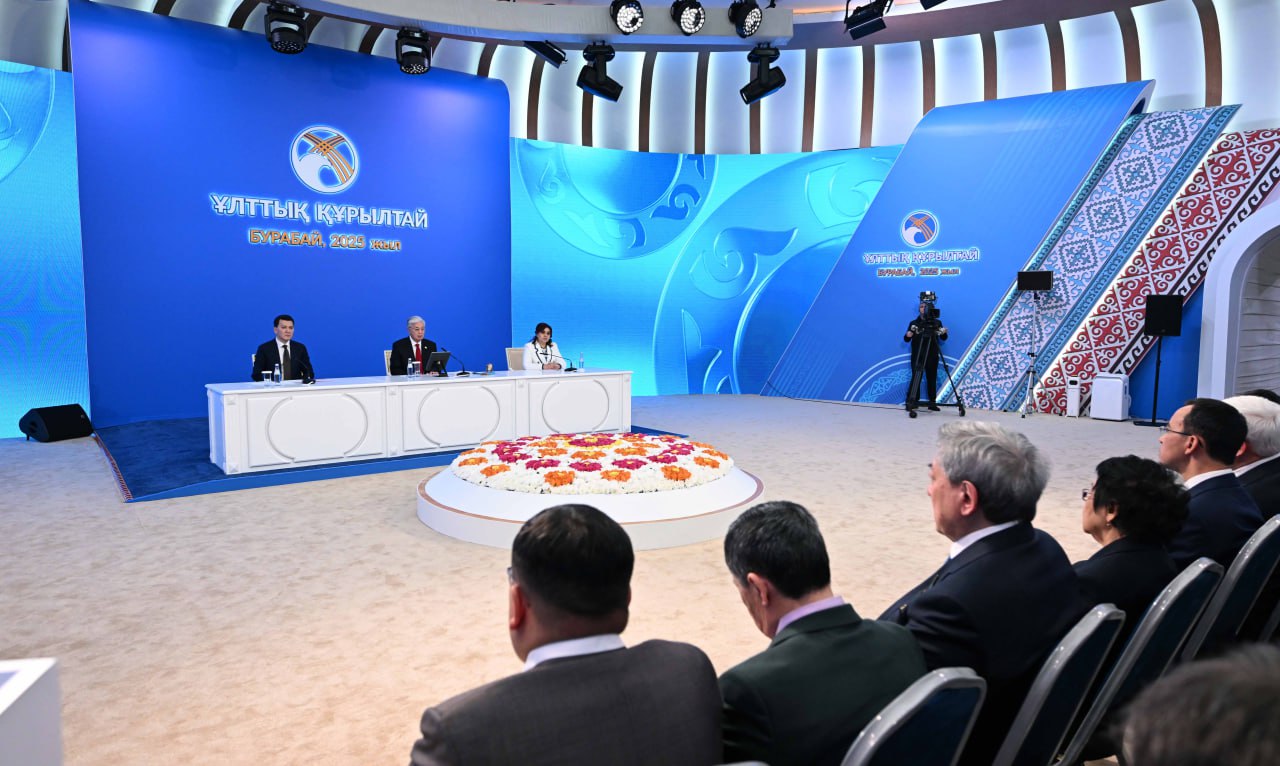ASTANA — Speaking at the National Kurultai in Burabai on March 14, President Kassym-Jomart Tokayev unveiled a series of ambitious projects aimed at strengthening Kazakhstan’s infrastructure, regional development, and digital transformation. He emphasized the need for economic innovation to ensure the country remains competitive on the global stage.

Photo credit: Akorda
Infrastructure projects and 200 annual investment initiatives
President Tokayev announced the launch of a significant infrastructure project designed to enhance Kazakhstan’s connectivity. The government has been instructed to begin construction of a highway from Astana through Arkalyk, Turgai, and Irgiz, directly linking to the Trans-Caspian International Transport Route, also known as the Middle Corridor. This new highway will shorten the distance between the country’s central and western regions by 560 kilometers, serving as a catalyst for the development of the entire Turgai region.
Tokayev reiterated that the airport in Arkalyk should be repaired, and a new terminal complex should be built. According to him, these measures will not only enhance the country’s transport connectivity but also facilitate the development of agricultural land and livestock farming in Central Kazakhstan.
He highlighted that this initiative is just one of many spanning various sectors, including engineering, metallurgy, petrochemicals, agro-industry, and transport logistics.
“Over the next four years, nearly 200 investment projects will be launched annually nationwide. This will help shape a new industrial framework and strengthen Kazakhstan’s transit and transport potential. Major infrastructure projects are essential for our nation. They expand economic opportunities for the regions, create thousands of new jobs, and ultimately contribute to improving citizens’ well-being. In essence, the implementation of large-scale projects is the only way to reinforce our country’s regional leadership,” Tokayev said.
Digitalization, AI, and the innovation economy
As for digitalization, Tokayev stressed that it will significantly improve budget allocation, optimize tax and customs administration, enhance public procurement, and simplify interactions between citizens and the state. He directed relevant agencies to collaborate closely with experts and IT specialists to develop and implement new solutions aimed at reducing costs, increasing transparency, and boosting productivity across all sectors.
“This issue remains under my direct supervision,” he said.
Tokayev also stressed the need for digital transformation to drive Kazakhstan’s competitiveness, particularly in the realm of digital assets and blockchain technology.
“Urgent measures must be taken to liberalize regulations governing the legal circulation of digital assets, cryptocurrency exchanges, and investment in digital mining. This will strengthen Kazakhstan’s position as a regional hub for digital financial technologies, reduce the shadow economy in digital assets, and increase tax revenues,” he said.
Tokayev underscored the importance of digital transformation and the adoption of AI, highlighting that technological advancements will determine the future global leaders.
“AI is driving a fundamental transformation across all sectors of the economy and the labor market. The very nature of work and human activity is changing. Against this backdrop, a new phenomenon has emerged—the innovation economy, where unconventional thinking, creative ingenuity, and social skills take center stage,” he said.
Recognizing the crucial role of scientific research, Tokayev emphasized that Kazakhstan is making progress in applied sciences, with a growing emphasis on commercializing discoveries and strengthening the link between research and industry. However, he acknowledged that the country still lacks a dedicated science city.
While discussing proposals for a science city near Almaty within the Alatau Innovative Technology Park, Tokayev also addressed the possibility of Kurchatov emerging as another key scientific hub. He noted that the city’s established expertise and traditions could make it an ideal location for such a project. However, he stressed that all plans must be based on careful calculations and realistic execution.
“We have seen enough empty promises — there will be strict accountability for results,” he warned.
Bridging economic disparities in regional development
Tokayev noted that creating three new regions in 2022 has significantly boosted their development.
“This was the right decision—social and economic indicators have significantly improved, and investment has started flowing in,” he said.
He highlighted that, following his directive, several border districts in the Abai and East Kazakhstan regions have regained their former status, which the public welcomed.
“Life in these areas has been revitalized, and infrastructure is beginning to improve,” he noted.
Tokayev stressed the importance of identifying areas lagging in environmental standards, infrastructure, and social services to address regional development gaps.
“The government should focus its efforts on addressing these disparities,” he said.
To achieve this, he announced the development of a Regional Development Concept, a comprehensive strategy designed to reduce regional gaps and enhance inter-agency coordination.
